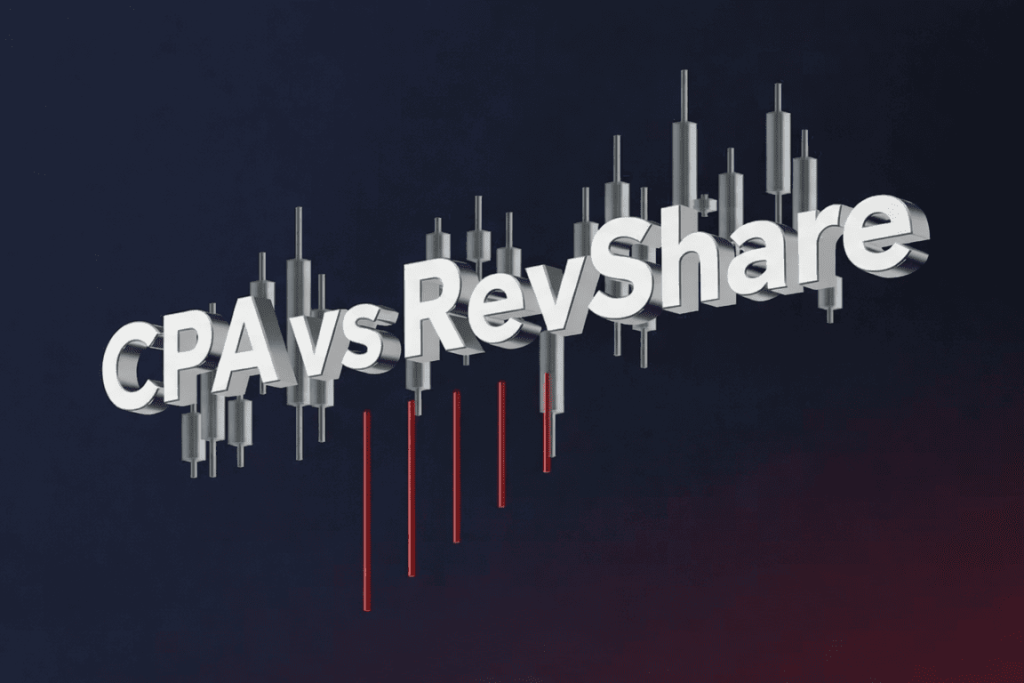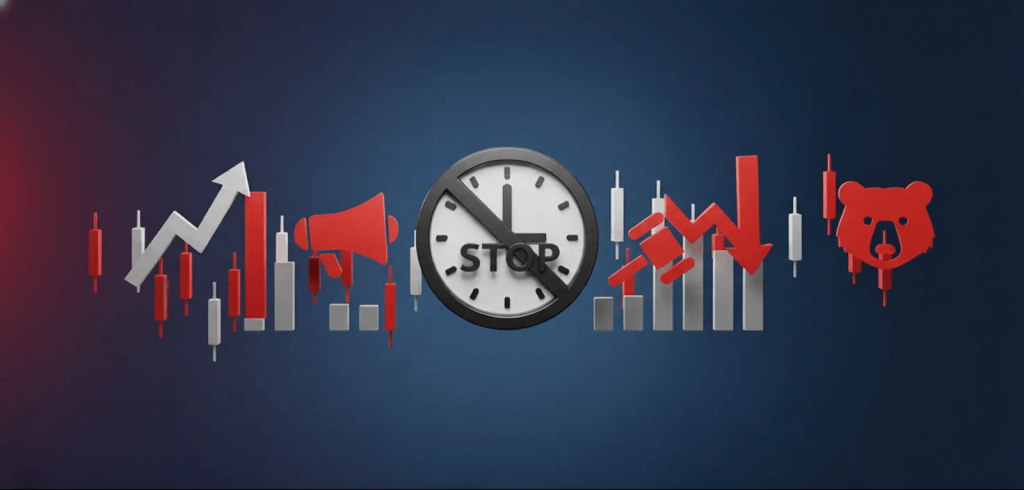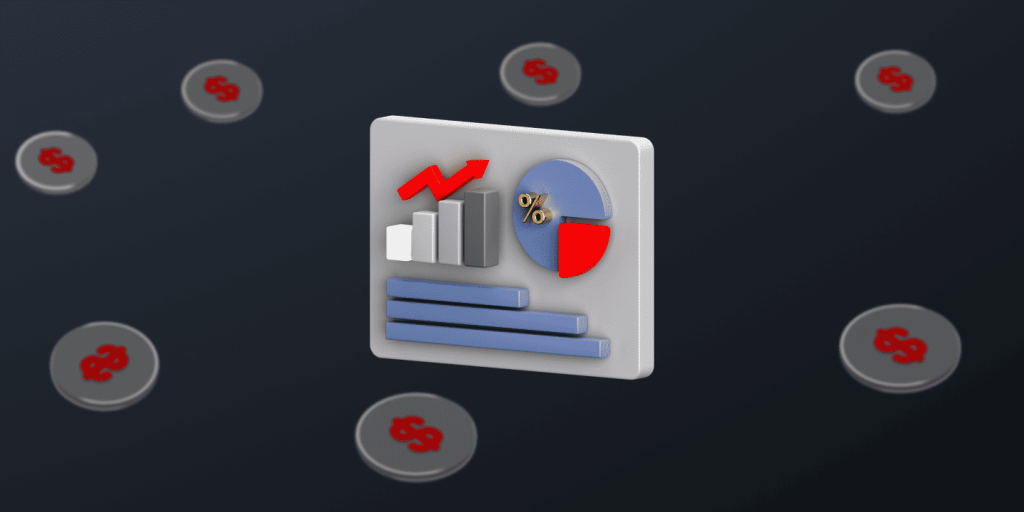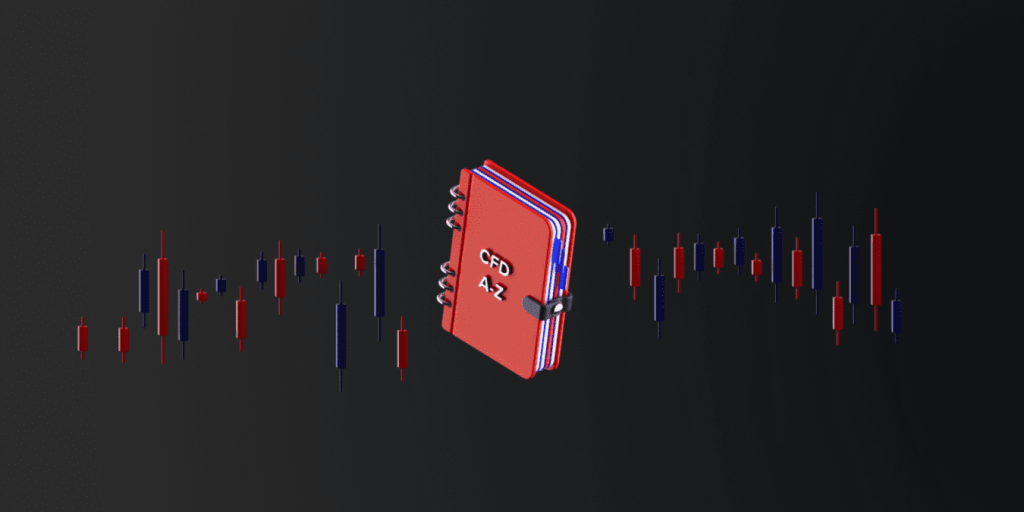
Dominando a corretagem de CFD de marca branca de A a Z: um guia abrangente
Conteúdo
O mundo das finanças é bastante complexo e vasto. Neste mundo, os contratos por diferença (CFDs) são uma parte importante da oportunidade de negociação. Se você está planejando abrir uma corretora de CFD usando o modelo de Marca Branca, é importante entender o básico, como tudo funciona e quais regulamentações a regem. Neste artigo, detalharemos tudo o que você precisa saber sobre corretagem de CFD se quiser utilizar o modelo de Marca Branca, começando pelos conceitos mais básicos.
O que é negociação de CFD?
Um contrato por diferença é uma forma popular e comum de negociação de derivativos. Em palavras simples, é um contrato entre uma corretora e um trader. Para não comprar realmente um ativo (como uma ação ou uma commodity), você celebra um contrato baseado nas variações de preço desse ativo.
O princípio básico da negociação de CFDs é bem simples. Ao entrar em uma negociação, você tenta prever se o preço do ativo subjacente subirá ou cairá. O ativo subjacente pode ser qualquer coisa, desde commodities como ouro ou petróleo até índices de ações e até pares de moedas.
Na negociação de CFD, você pode “comprar” (“assumir uma posição comprada”) prevendo que o preço de um ativo aumentará. Por outro lado, se você acredita que o preço de um ativo cairá, você “vende” (“assume uma posição vendida”). Essa flexibilidade é um dos principais atrativos da negociação de CFDs, que ajuda os traders a lucrar em diferentes condições e sentimentos de mercado.
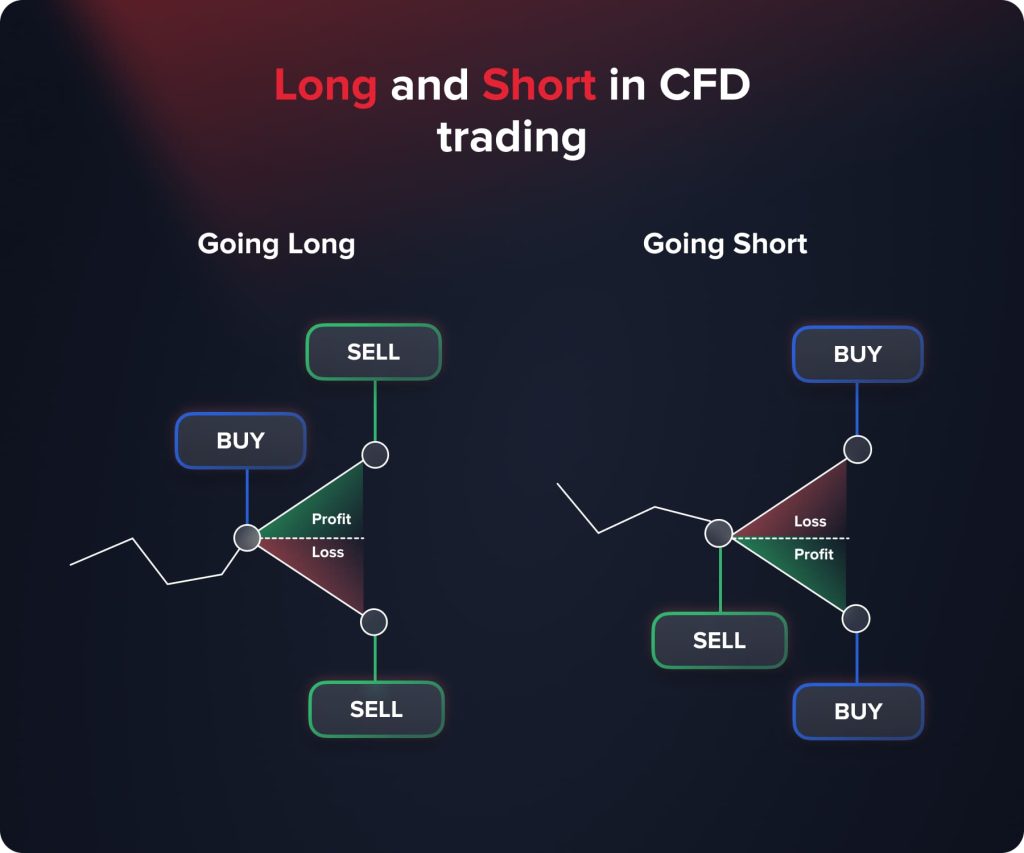
Um aspecto muito importante dos CFDs é a alavancagem. Isso significa que um trader pode administrar uma posição grande com um orçamento relativamente pequeno. No entanto, é importante perceber que, embora a alavancagem possa multiplicar os lucros, ela também apresenta o risco de aumentar as perdas.
Quando uma negociação é fechada, um lucro ou prejuízo é realizado na negociação de CFD. Caso sua previsão sobre a direção do preço do ativo estiver correta, você obtém lucro. No caso oposto, você sofrerá uma perda. O valor do seu ganho ou perda é determinado pela diferença entre o preço no momento em que você abre a negociação e o preço no momento em que você a fecha.
Por que algumas pessoas escolhem a negociação de CFD
A negociação de CFDs se destaca por sua versatilidade. Ajuda os traders a multiplicar seus portfólios negociando em diferentes mercados. Além disso, como os traders não possuem o ativo real, não há necessidade de aprovação da conta de corretagem ou dos processos de diversas unidades associados à propriedade real.
Embora a negociação de CFD ajude a ter uma maneira flexível e acessível de acessar vários mercados, como todos os sistemas de negociação, é importante ser competente e entender os riscos envolvidos. Estudo aprofundado, criação de uma estratégia e previsão de riscos são essenciais para o sucesso na negociação de CFDs.
Serviços de corretagem de CFD
O Forex é o maior mercado financeiro do mundo. No mercado Forex, os traders especulam sobre os movimentos futuros dos preços de uma moeda em relação a outra, por exemplo, o dólar americano em relação ao franco suíço ou euro. Os principais fatores-chave no mercado Forex são indicadores econômicos globais, eventos geopolíticos, políticas de bancos centrais e notícias financeiras internacionais.
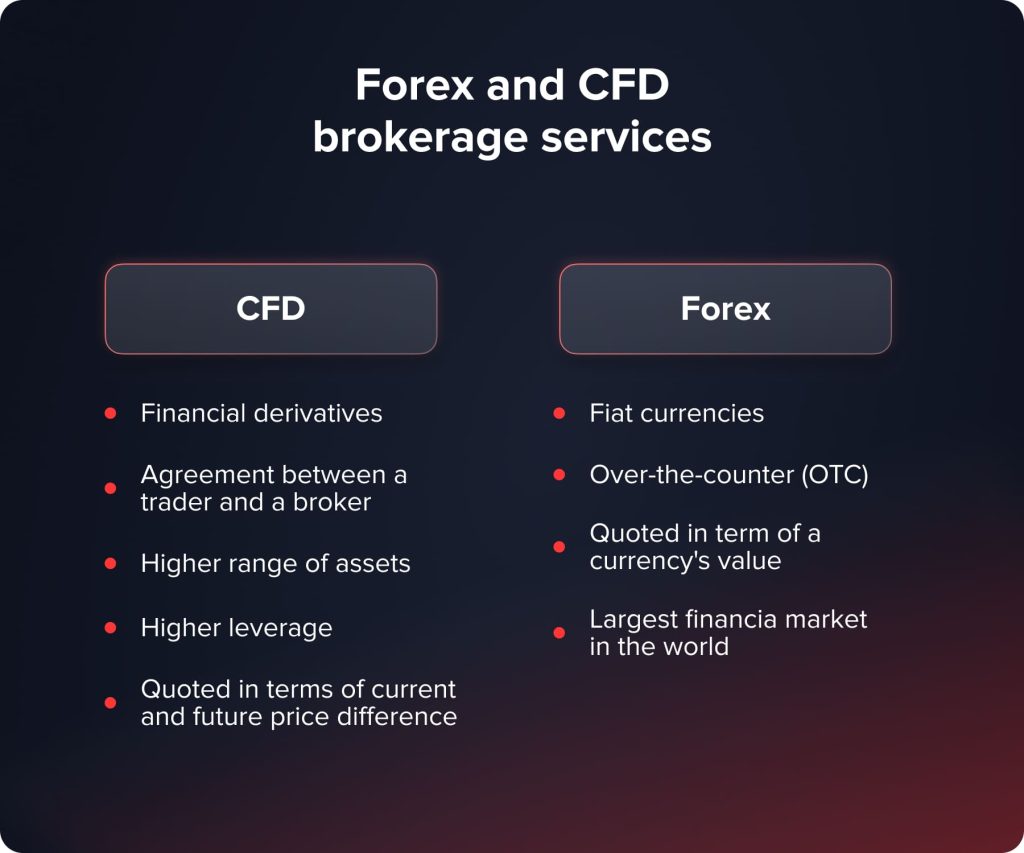
Comparação de Forex e CFDs
Lista de ativos: A negociação de Forex é limitada a pares de moedas. Em contraste, os CFDs cobrem uma variedade de ativos, aumentando as oportunidades para os traders.
Indicadores de influência do mercado: Embora as condições econômicas globais e as políticas dos bancos centrais influenciem significativamente o Forex, os CFDs são suscetíveis a uma gama mais diversificada de fatores, dependendo do ativo que está sendo negociado.
Horário de negociação: Os mercados de Forex operam 24 horas por dia, cinco dias por semana, devido ao seu nível global. Os horários de negociação de CFDs, diferentemente do Forex, variam de ativo para ativo. Por exemplo, o horário de negociação de um CFD de ação corresponderá ao horário da bolsa de valores na qual a ação subjacente está listada.
Liquidez: O mercado de Forex, tendo em vista os enormes volumes de negociação, tem uma liquidez incrível. Os mercados de CFD, embora líquidos, podem variar significativamente dependendo do ativo negociado e das características específicas do mercado.
Perfil de risco: Embora ambos os mercados tenham riscos característicos, os CFDs, devido aos seus múltiplos ativos, podem oferecer aos traders a oportunidade de expandir seu portfólio, alocando e gerenciando melhor os riscos no futuro.
Requisitos de margem: Negociar Forex pode dar aos traders mais alavancagem do que negociar CFDs, o que significa que eles podem controlar uma posição de Forex maior com menos capital. No entanto, isso pode ser uma faca de dois gumes: é importante observar que, embora uma alavancagem maior possa aumentar seus lucros, ela também aumenta as perdas.
Estratégias de negociação: Dadas as características únicas de cada mercado, estratégias diferentes podem ser mais apropriadas para um mercado específico. Por exemplo, o scalping, que envolve diversas pequenas negociações para aproveitar flutuações de preços menores, pode ser mais comum no Forex devido à sua liquidez e spreads baixos. Em contraste, estratégias de acompanhamento de tendências de longo prazo podem ser mais aplicáveis em certos mercados de CFDs devido à dinâmica de oferta e demanda.
Corretagem
O sucesso da corretagem de CFD depende de todas as diversas partes integrantes trabalhando juntas em uníssono, com cada uma sendo responsável por uma faceta específica da experiência de negociação.
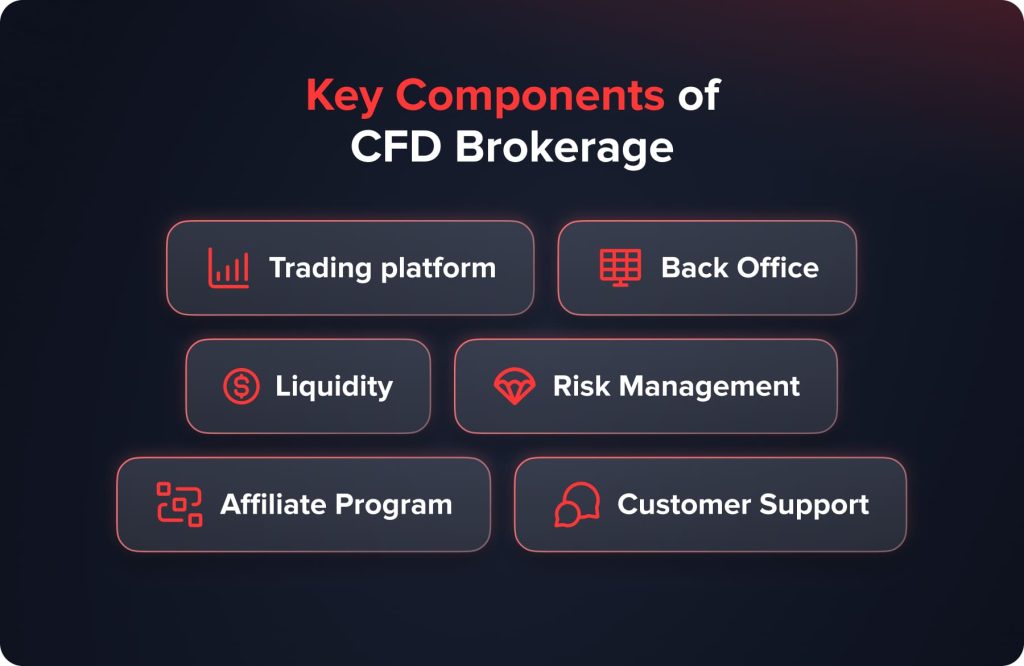
Plataforma de negociação
A plataforma de negociação é onde toda a ação acontece. Portanto, esta é talvez a parte mais integral de uma corretora de CFD. A plataforma ideal oferece confiabilidade técnica e facilidade de uso. Embora sua base esteja em algoritmos complexos que processam dados em tempo real, o usuário deve ser capaz de executar as tarefas sem muita dificuldade.
As corretoras profissionais devem se colocar no lugar dos traders, escolhendo plataformas que ofereçam as melhores ferramentas analíticas, dados em tempo real e design intuitivo. Atualizações regulares com base no feedback do usuário não apenas melhoram a funcionalidade, mas também mostram o interesse da corretora em seus clientes.
Administração
Muitas vezes trabalhando nos bastidores, o back-office fornece funcionalidade administrativa e operacional contínua. Não se trata apenas do histórico de transações ou relatórios financeiros; trata-se da facilidade de acessar e compreender esses dados. Ferramentas de relatórios automatizadas e compreensíveis são essenciais e, como medida prática, as corretoras devem procurar sistemas que possam ser expansivos. À medida que a base de clientes cresce, o back-office deve ser capaz de se adaptar, aumentando sua eficiência facilmente.
Liquidez
Na negociação de CFDs, a liquidez serve como elo entre a ação do trader e a reação do mercado. Uma ampla gama de provedores de liquidez oferece aos traders a capacidade de comprar ou vender ativos sem influenciar indevidamente o preço do ativo. Embora uma fonte específica de liquidez possa parecer simples, ela pode se tornar de alto risco durante picos de mercado. Portanto, lidar com vários fornecedores não apenas garante o cumprimento ideal das ordens, mas também protege a corretora de eventos imprevisíveis de mercado.
Gerenciamento de riscos
Por trás de algoritmos complexos e medidas de proteção existe uma medida de educação do trader. Embora ferramentas como ordens Stop-loss ou Take-profit sejam essenciais, praticá-las é essencial. Para aumentar o conhecimento, as corretoras devem considerar iniciativas educacionais, como webinars, tutoriais ou artigos. Para educar outros traders sobre gerenciamento de riscos, a colaboração é necessária. Afinal, um trader bem-informado tende a tomar melhores decisões, contribuindo para um ambiente de negociação mais saudável para todos os participantes.
Programa de afiliados
O crescimento, especialmente o crescimento orgânico, costuma ser um indicador importante de uma corretora bem-sucedida. Parceiros e apresentadores desempenham um papel importante aqui. Gostaria de salientar que, embora pareça promissor atrair vários parceiros, a qualidade deve ser sempre mais importante que a quantidade. As corretoras devem entender a importância de garantir que seus parceiros estejam alinhados com os princípios e valores da sua marca. Comunicações regulares e avaliações de desempenho com parceiros podem ajudar a manter relacionamentos colaborativos que beneficiam todas as partes.
Suporte ao cliente
O suporte ao cliente é muito mais do que simplesmente lidar com clientes insatisfeitos. Trata-se de construir relacionamentos de qualidade, fornecendo um serviço de primeira linha. Um fator importante para um ótimo atendimento ao cliente é fornecer treinamento contínuo à equipe. Isso garante que a equipe de suporte seja bem-treinada tanto na funcionalidade da plataforma quanto nas especificidades do mercado.
No vasto mundo da corretagem de CFDs, entender e melhorar esses componentes não é uma opção, mas uma necessidade. As corretoras que conseguem garantir uma unidade coesa aumentam a probabilidade de sucesso da corretora, bem como ganham uma reputação confiável, conquistando, assim, a confiança dos clientes.
Regulamentação de corretagem de CFD
As corretoras de CFD, como muitas outras organizações financeiras, estão sujeitas a regras e regulamentos. Essas restrições existem para manter condições equitativas, incentivar a comunicação aberta e salvaguardar os interesses de todos os traders. O objetivo da regulamentação da corretagem de CFD é proteger os traders de atos potencialmente injustos e, ao mesmo tempo, garantir que as corretoras operem dentro de limitações morais e práticas específicas. Essas políticas não são apenas atividades para uma organização; elas são baseadas em experiências anteriores, lições aprendidas e na natureza mutável dos mercados financeiros. Elas existem para combater fraudes, eliminar a manipulação de mercado e promover um ambiente de transparência e jogo limpo.
Licença
Antes de iniciar um negócio de corretagem, as empresas devem obter as licenças apropriadas dos órgãos reguladores relevantes. O processo de obtenção dessas licenças costuma ser muito difícil e exige muitos passos. Isso incluirá um exame minucioso do modelo operacional da corretora, sua saúde financeira e a confiabilidade de seu pessoal principal. Cada país geralmente tem seu próprio órgão regulador, por exemplo, o Reino Unido tem a FCA, e os EUA têm a SEC.
Compliance contínua
Após a aprovação inicial, normas e princípios amplamente aceitos devem ser rigorosamente seguidos. Os reguladores ajustam rotineiramente suas regras básicas para refletir tendências de mercado em evolução, avanços tecnológicos e razões macroeconômicas. As empresas de corretagem devem se manter atualizadas sobre esses desenvolvimentos. Auditorias regulares, tanto internas quanto externas, garantem que uma corretora esteja cumprindo as regulamentações especificadas. O não cumprimento dos requisitos não só acarreta o risco de multas, mas também pode prejudicar consideravelmente a confiança do cliente na corretora, resultar em grandes penalidades financeiras e até mesmo levar à perda da licença para operar.
Construção de confiança e confiabilidade
Além de uma licença oficial, a forma como uma empresa cumpre os requisitos regulatórios terá uma vantagem comercial tangível. Para quase todos os traders, especialmente aqueles com grande capital, pesquisar e avaliar corretoras com base em sua reputação de compliance é o passo mais importante no processo de seleção. Corretoras que conseguem construir confiabilidade e confiança por meio da adesão a todas as regulamentações necessárias podem atrair uma base de clientes mais fiel e rica.
Quanto custa abrir uma corretora de CFD?
Iniciar uma corretora de CFD tem preços variados com base na estratégia que você usa. Se você está pensando em começar um negócio do zero, planeje um período de implementação de seis meses e despesas iniciais de $ 150.000 ou mais, incluindo infraestrutura tecnológica, compliance regulatória e despesas operacionais iniciais. Uma alternativa mais viável é adotar uma solução de modelo de marca branca, que fornece uma plataforma e infraestrutura prontas para uso. Isso pode ser feito consideravelmente mais rápido, potencialmente em duas semanas, e pode começar em $ 20.000.
Como iniciar uma corretora de CFD de marca branca?
Abaixo, descreveremos algumas das principais etapas para quem deseja abrir sua própria corretora. Esta lista não é exaustiva, mas destaca os pontos principais. Aqueles que desejam abrir sua própria corretora devem lembrar que são necessárias pesquisas e planejamentos mais meticulosos.
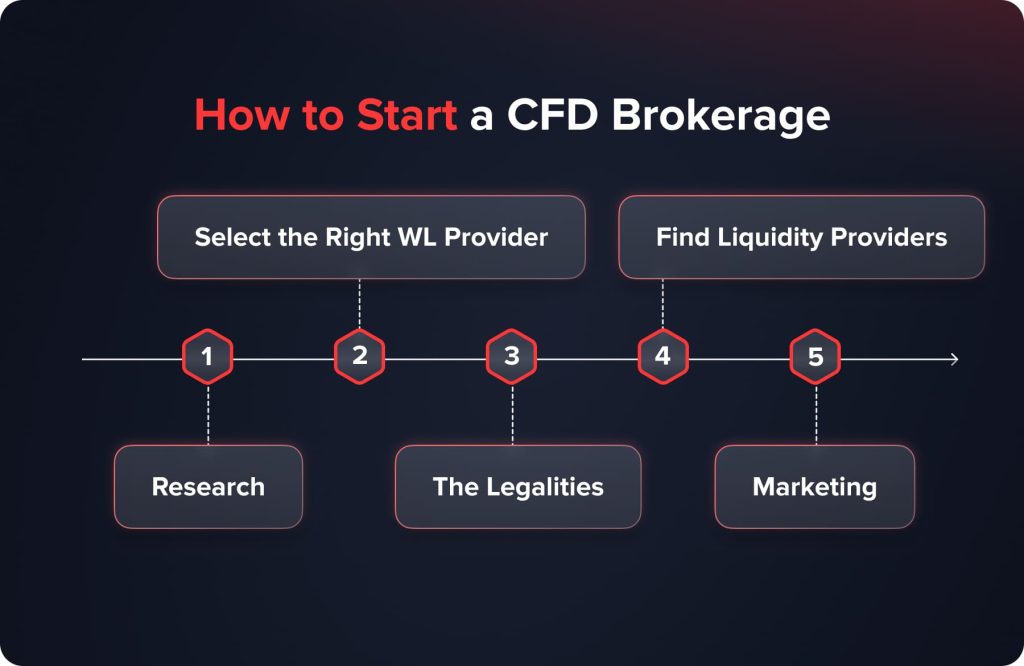
Pesquisa
Realize uma pesquisa de mercado completa para identificar lacunas nos serviços oferecidos pelos seus possíveis concorrentes, bem como compreender seus pontos fortes. Esta pesquisa também deve investigar e descobrir as necessidades, desejos e preferências do seu público-alvo. Use ferramentas como Análise SWOT e As cinco forças de Porter para aprimorar sua posição competitiva. Uma pesquisa completa ajudará você a desenvolver um projeto detalhado para que você possa visualizar sua corretora no mundo mais amplo da negociação.
Selecione o provedor de marca branca certo para você
Uma decisão crucial é com quem você fará parceria ao iniciar sua corretora. Como o sucesso da sua corretora depende diretamente do provedor de marca branca, certifique-se de escolher um provedor com um histórico e reputação excelentes. Observe sua confiabilidade, inovação e desejo de continuar melhorando. Estude o suporte ao cliente: eles estão disponíveis 24 horas por dia, 7 dias por semana? Eles são robustos? Eles sabem o que estão fazendo? Existem várias maneiras de contatá-los? Considere também a capacidade deles de crescer junto com você: se você atingir suas metas e quiser expandir, eles conseguirão acompanhar seu crescimento? Você vai querer garantir que o tempo de atividade da sua corretora de marca branca esteja o mais próximo possível de 100%.
As legalidades
As corretoras de CFD devem cumprir com qualquer regulamentação que o órgão regulador do país apresente. Portanto, uma ótima equipe jurídica é absolutamente vital para o sucesso de uma corretora. Com uma equipe jurídica sólida, você será capaz de contornar as “minas terrestres” regulatórias. Como os órgãos reguladores podem aplicar multas enormes aos infratores, uma boa equipe jurídica valerá seu peso em ouro.
Encontre provedores de liquidez
A liquidez é a alma de qualquer corretora. Sem liquidez, uma corretora irá secar e morrer, especialmente no mundo das finanças. A liquidez é crucial para entrar e sair de posições e, se uma corretora não for capaz de dar suporte às negociações, ela perderá rapidamente sua base de clientes. Portanto, encontre e faça parcerias com provedores de liquidez confiáveis. Além disso, certifique-se de nunca se limitar a apenas um provedor de liquidez. Diversifique o máximo possível para garantir o máximo de suporte possível para seus traders.
Marketing
De que adianta uma corretora que cumpre as regulamentações, tem ótimo suporte ao cliente e conta com diversos provedores de liquidez confiáveis se ninguém sabe disso? Desenvolva uma estratégia de marketing abrangente que destaque todas as melhores coisas que sua corretora pode oferecer. Certifique-se de que o plano de marketing inclua marketing de conteúdo, anúncios pagos, materiais educacionais gratuitos, mídias sociais e seus influenciadores, construção de comunidade e muito mais. Quanto mais abrangente for seu plano de marketing, maior será a base de clientes que você poderá construir.
Conclusão
O interesse comercial dos mercados financeiros, combinado com a alta lucratividade da negociação de CFDs torna a criação de uma corretora de CFD de marca branca uma proposta promissora. Entretanto, junto com os possíveis benefícios vem a responsabilidade de fornecer um ambiente de negociação transparente, justo e eficiente. Com preparação cuidadosa, compliance regulatória e um forte compromisso com a qualidade, os aspirantes a corretoras podem não apenas lançar com sucesso sua Corretora de CFD de marca branca, mas também causar um amplo impacto no crescente mundo da negociação financeira.
Atualizado:
27 de março de 2025

